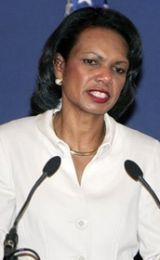US’s Rice warns Sudan against imposing new Darfur conditions
June 24, 2007 (PARIS) — The world has fallen down on the job of ending killings and other violence in Sudan’s Darfur region, U.S. Secretary of State Condoleezza Rice said Sunday as she welcomed the fresh energy that France’s new conservative-led government has put to the Darfur cause.

Rice also welcomed a summit Monday between the Israeli and Palestinian leaders in Egypt, calling Arab support for embattled Palestinian President Mahmoud Abbas more important than his western backing. She acknowledged the difficulties Abbas has faced since his Islamic rivals Hamas won Palestinian elections last year.
“Democracy is hard,” she told reporters at a news conference with French Foreign Minister Bernard Kouchner.
The chief U.S. diplomat was in Paris for two days of get-to-know-you meetings with the new conservative-led French government and a strategy session on Darfur.
Kouchner organized Monday’s conference to speed deployment of about 20,000 new peacekeeping troops to Darfur, the vast, arid region where an estimated 200,000 have died in fighting between African rebels and militias backed by the Arab-led Sudanese government. The conflict has driven about 2.5 million from their homes.
“I have seen firsthand the devastation and the difficult circumstances in which people live in Darfur, and I will be very frank,” Rice said. “I do not think that the international community has really lived up to its responsibilities there.”
Rice visited Darfur in 2005, spending an afternoon in a refugee camp. Kouchner, who co-founded the Nobel Prize-winning aid group Doctors Without Borders, has been to Darfur more frequently and more recently.
Sudan was not invited to the conference, a decision that Kouchner justified Sunday.
“This is not a ‘peacemaking’ meeting, but on the contrary, a meeting to support the international efforts that have been deployed,” he said.
Kouchner and Rice noted that China will attend the session. China has trade and energy ties to Sudan and has been accused of running interference for the Khartoum government.
Before arriving Sunday, Rice warned Sudan’s government not to renege on its recent agreement to allow a larger peacekeeping force into Darfur. The peacekeepers would come from the African Union and the United Nations.
“If in fact the Sudanese are prepared to accept the hybrid force, they need to accept it once and for all and stop the process of trying to scale it back,” Rice said in a news conference aboard her plane. “It seems one step forward, two steps back with the Sudanese government.”
Rice’s trip is a coming-out party for what the Bush administration hopes will be a happier relationship with French President Nicolas Sarkozy after perceived slights and lectures from his predecessor, Jacques Chirac.
Chirac was the U.S. ally most at odds with U.S. President George W. Bush over the Iraq invasion and remained a critic of other U.S. military and anti-terrorism actions.
Washington has grumbled that France sells too much sensitive military technology and armament to potentially unscrupulous buyers. But the United States also has praised France for its participation in the international force in Afghanistan.
Part of Monday’s session on Darfur was expected to try to flesh out a French proposal for a small, interim peacekeeping force to protect vulnerable refugee camps in neighboring Chad, where some Darfur refugees have fled.
U.S. officials said last week they welcome the idea, partly for what it says about French commitment to take a leading role in the conflict.
The conference is focused on arrangements for the much larger peacekeeping force for Darfur. The Sudanese government agreed to the force this month, but the details remain vague.
A force of U.N. and AU peacekeepers would replace a 7,000-member AU contingent now in Darfur. That ill-equipped and underfunded force has failed to stop four years of warfare that has left more than 200,000 people dead. Sudan has agreed to allow up to 19,000 peacekeepers, fewer than the 23,000 envisioned in the original U.N. plan.
(AP)
